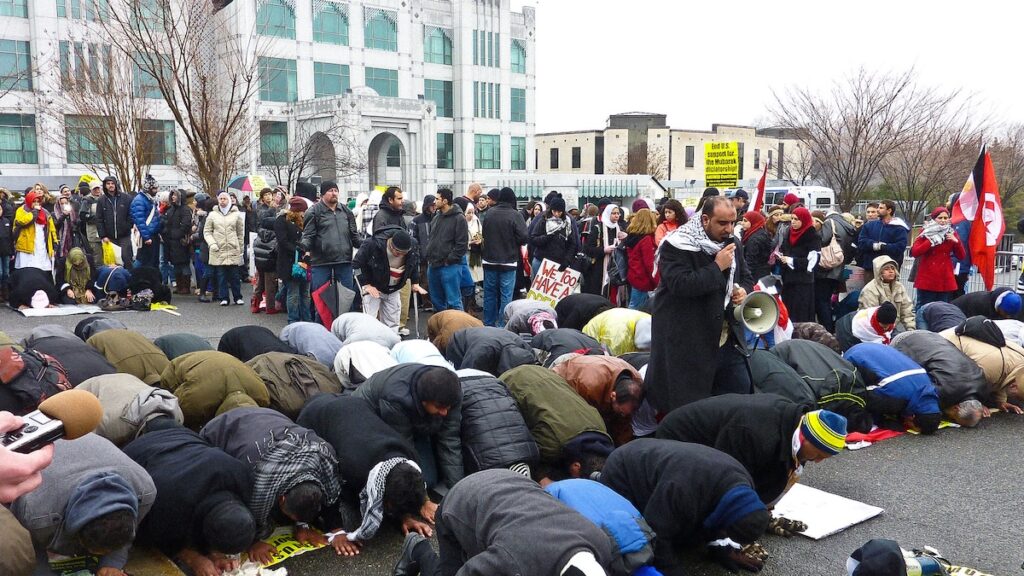Quebec has always had a complicated relationship with religion in public life. The Quiet Revolution in the 1960s moved power away from the Catholic Church in schools and hospitals. More recently, laws like Bill 21 banned hijabs and other religious symbols for many public workers.
Now, Premier François Legault wants to push it even further. In a press conference in late August, he said the provincial government will introduce legislation this fall to ban organized prayers in public spaces such as sidewalks and parks. “Seeing people praying in the streets, in public parks, is not something we want in Quebec,” Legault said.
The proposed legislation seems minor. But critics argue it could have significant consequences for religious freedom.
The reaction from rights groups was quick. The Canadian Civil Liberties Association warned that a ban on public prayer would go against freedoms of religion, expression, assembly and association.
The Canadian Constitution Foundation called it “an assault on the constitutionally protected right to freedom of religion.” CCF litigation director Christine Van Geyn put it simply: “Secularism does not require hostility to people of faith, and that is what this proposed law represents.”
If the bill passes, court difficulties are almost guaranteed. Quebec may even use the notwithstanding clause, like it did with Bill 21, to block Charter challenges. That would only deepen tensions with Ottawa.
“Secularism does not require hostility to people of faith, and that is what this proposed law represents.”
Although the text of the bill does not single out one faith, Legault’s own words made the target clear: “Today, I want to send a very clear message to the Islamists,” he said. Muslim communities will bear the pressure of its impact, rights advocates say.
Public prayers — like Islam’s Friday prayers, known as Jumu’ah — sometimes take place outdoors during large gatherings or political demonstrations. For many Muslims, the message is evident: their religious practices are being presented as out of place in Quebec’s public life.
Some experts say Quebec doesn’t need a full ban on public prayer to deal with problems like blocked streets or noisy gatherings. Josh Dehaas, a lawyer with the Canadian Constitution Foundation, told reporters that implementing existing laws could be enough. “Enforce existing laws against blockades and ticket those who block traffic and violate noise bylaws, don’t attack all people of faith,” he says.

The attack feels familiar to many Muslims in the province. Bill 21, Quebec’s secularism law, was written in neutral language but has been widely criticized for affecting Muslim women who wear the hijab. The same concern is being raised here: neutral wording, unequal effects.
But Muslim groups aren’t the only ones raising concerns. Catholic leaders are also speaking out. Archbishop Christial Lepine of Montreal wrote in La Presse that banning public prayer risks confusing “the neutrality of the state with the neutralization of society,” as quoted in CP24.
Quebec’s Catholic bishops said they were “stunned” by the proposal. They pointed out that Catholics regularly pray in public, whether during processions or even before meals in a park. As one bishop asked in CityNews Montreal: “If we pray before the meal, are we going to be suspect?”
At the heart of the issue is a clash of values, rights advocates say. Quebec’s version of secularism focuses on keeping religion out of public spaces, while Canada’s federal multiculturalism allows people to show their identity in public life.
Quebec’s version of secularism focuses on keeping religion out of public spaces, while Canada’s federal multiculturalism allows people to show their identity in public life.
That’s why these laws are sparking national debates. Supporters argue that banning public prayer protects social unity. Opponents argue it chips away at Canada’s reputation for multiculturalism and diversity.
This debate isn’t just a Quebec issue.
If the law passes, experts suggest it could set a precedent for how governments handle public religious expression across the country. It could also increase a division between two different groups. Muslim communities may feel further excluded, while other faith groups could begin to oppose what they see as government overreach.
Critics say it could also damage Canada’s reputation. It’s difficult for the Canadian government to condemn religious restrictions abroad if one of its own provinces is doing the same at home.
Quebec’s proposed prayer ban is not just about sidewalks and parks. It raises bigger questions about religious freedom, multiculturalism and the limits of provincial power. Whether it’s in a courtroom, at a church procession or during Friday prayer, the fight over religion in Quebec’s public spaces is just the beginning.

